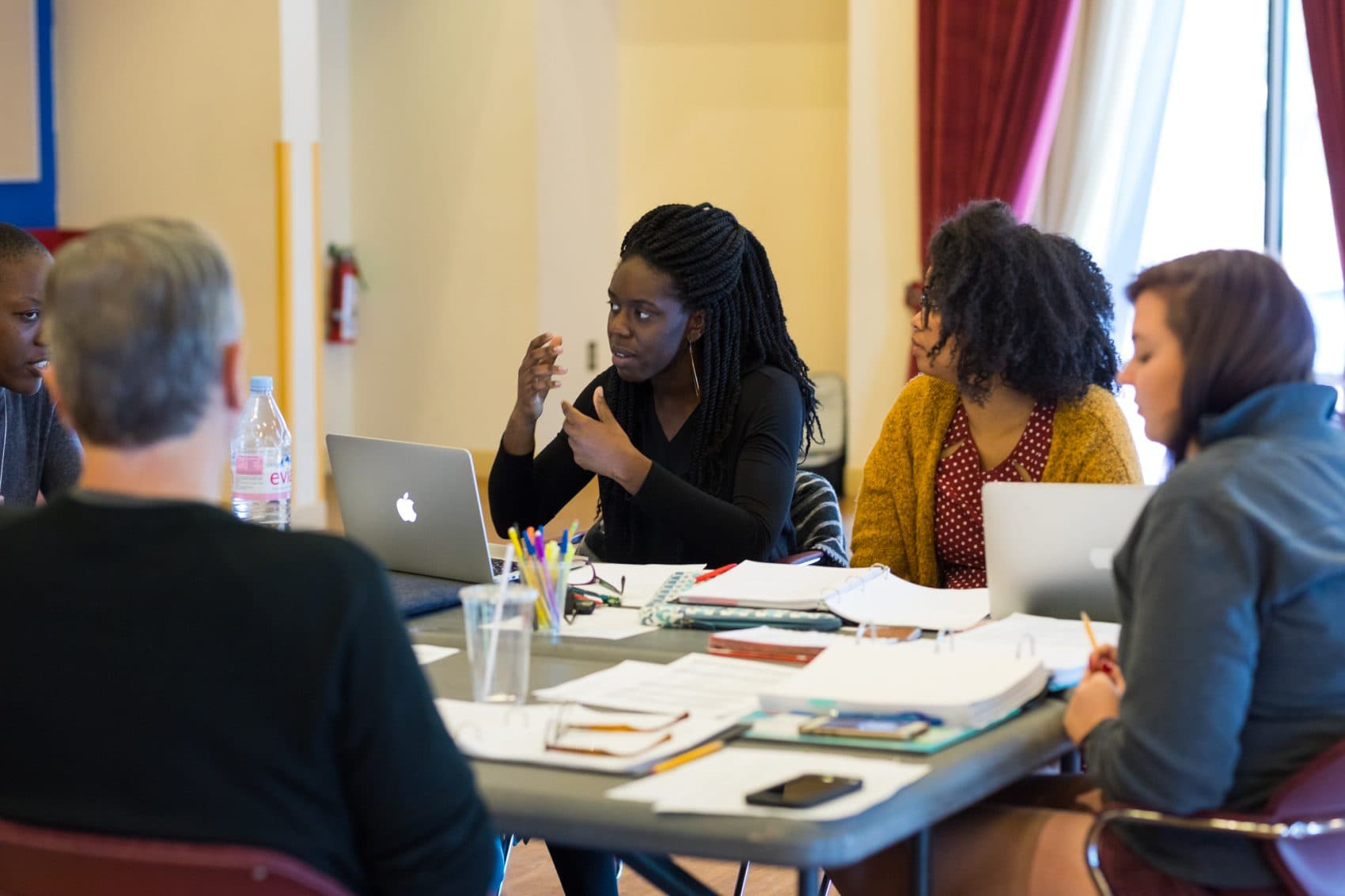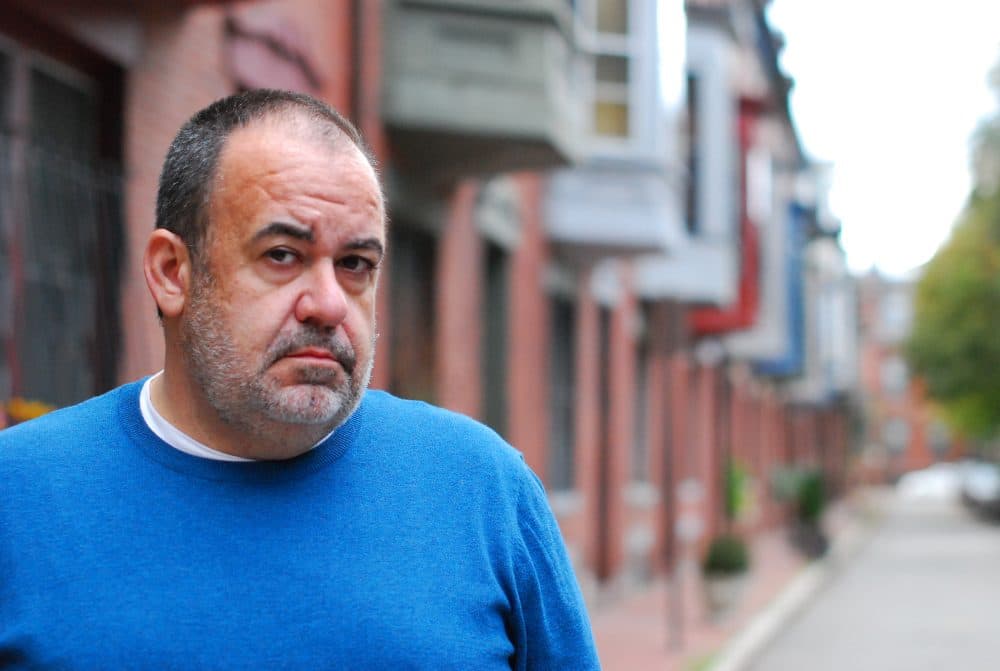Advertisement
SpeakEasy's Boston Project Gives Voice To Local Stories And Playwrights

Paul Daigneault, SpeakEasy Stage Company’s producing artistic director, thinks that Boston’s theater scene is one of the best kept secrets in America — and he’s tired of it.
“Our mission at SpeakEasy, for our 26-odd years that we’ve been around, has always been to do new things in Boston. And for many years, we billed ourselves as doing Boston premieres,” Daigneault explains. “What that meant was, most often, shows that had some success in other cities like Chicago, or New York, or the West Coast, for some reason caught my interest and I brought them to Boston.”
As a result, he shares, Boston soon became regarded as a sort of “testing ground” where promising new plays would visit from other cities before moving on. For years, a largely held assumption was that Boston’s theatrical voice was shaped and defined by New York. The stories told here held little that resonated with the unique experiences the people of Boston have to offer. This sentiment is echoed by artistic associate Walt McGough, himself a working playwright.
“Every city in America has had to find a way to see themselves in New York, and see New York reflect their own experiences,” McGough says. “The more that cities focus on their own theatrical voices, and on their own local stories, the more that balance will start to shift. If people can see their experience reflected in a wealthy Manhattan apartment, they can also see their experience reflected in a black woman coder in Cambridge, or in a drag club in Bay Village.”
"The more that cities focus on their own theatrical voices, and on their own local stories, the more that balance will start to shift."
Walt McGough
Thus Daigneault and McGough sought to create The Boston Project, a unique incubator for new work now in its second year. Over the course of several months, play proposals are workshopped, edited and developed into full-scale productions. The program culminates with a staged reading, and the possibility of being invited to continue developing the work for a second year — and end up on the SpeakEasy mainstage within two to three seasons.
What separates The Boston Project from other playwriting intensives is its focus on telling stories specific to the cities of Boston, Cambridge and Somerville, thus reflecting onstage what its participants feel has been sorely lacking from the local cultural scene: a singular, specific voice.
“There's a lot going on in the city. What I feel is important is that we keep digging into, really, the tone of the city. There's something deeper than what we see on TV,” says Obehi Janice, one of the 2017 Boston Project’s chosen playwrights. Her new play, “Ole White Sugah Daddy,” centers on a woman of color working in the Cambridge tech and startup industry as a programmer.
Janice credits the program's success to its focus on local storytelling as well as McGough’s guidance as a fellow playwright. With The Boston Project’s support, she found herself able to branch out into an industry that was previously alien to her through in-person conversation, networking events, online connections and more. What started as an interest and an idea was given room to grow into the first draft of a full-length play.
“I was so interested in [the tech] industry that I’m not a part of, that I know nothing about, but that I’m so aware is racially coded, coded with gender, and access and opportunity every step of the way,” she says. “But what I kept seeing is even as you get higher up in the industry, you can still experience a lot of discrimination, and just a lot of hardship, as a woman. So not only is my main character a woman, and she's a programmer, but she's a black woman. She is instantly put into a very white space and also dealing with her gender as well. I'm learning a lot writing it.”
Janice’s freedom to dive deeper into developing her work was an experience paralleled by Rick Park, whose play “Knock Down, Drag Out” was also selected for The Boston Project program this year. (SpeakEasy is hosting a reading of both plays this week.)

His work centers on a community of drag queens who find their livelihoods threatened when a beloved South End club is foreclosed and condemned to make room for luxury condos. For Park, a longtime Boston resident, the work seeks to explore the places and people that can make a city feel like home — and what happens when we lose them.
“In the gay community, you are able to choose your family. We realize what family really means, and what’s important,” he says. Furthermore, “there are things that people miss in Boston that aren't here anymore. It’s something I’m really upset about when I see high-rises taking over neighborhoods.”
Without the support of The Boston Project, Park feels he may not have been able to tell these stories that are so important to him.
“How often do you get a bunch of people in a renowned theater company to sort of say, ‘Here. You have access to all of this. Tell us what you need?’” he asks. “They found me people to talk to. They hooked me up with a great dramaturg. Everyone's been really supportive. You don't find a lot of that in Boston, unless you're associated with a particular theater.”
Without McGough, Daigneault and the rest of the SpeakEasy team, Park says it’s likely his play would have remained an idea, or a draft in a folder. “I wouldn’t be here without them,” he concludes.
For both its participants and its principals, The Boston Project serves as a way to bring the community closer together and surface stories that need to be told.
"Building these kinds of stories not only lets us be more in communication directly with our audiences and the stories that matter to them, but it also helps Boston and its theatrical scene build confidence in its own storytelling that can then move out into the world."
Walt McGough
“Building these kinds of stories not only lets us be more in communication directly with our audiences and the stories that matter to them, but it also helps Boston and its theatrical scene build confidence in its own storytelling that can then move out into the world,” McGough says. “Ultimately, the goal of any program like this, at any theater, is that over time Boston starts to export more theater than it imports.”
While it may be just one program for new work, The Boston Project signifies the belief of local theater makers that Boston has important stories to tell and that great talent resides here, ready to make performance for its residents. They hope, with time, that this emerging voice will only increase in volume and depth, allowing Boston to have a seat at the table in both local and national conversations.
“Theater, to me, is empathy,” says Daigneault. “The more we can share this live experience — where we’re all sitting in a dark room together, putting down our phones and our devices and seeing and sharing and feeling other people's experiences, and being able to relate them to our own lives — is what the power of theater is.”